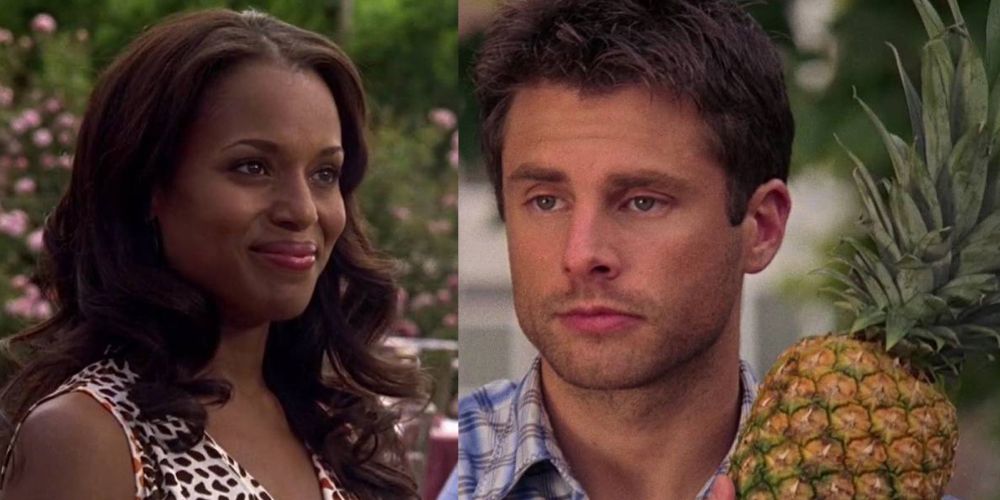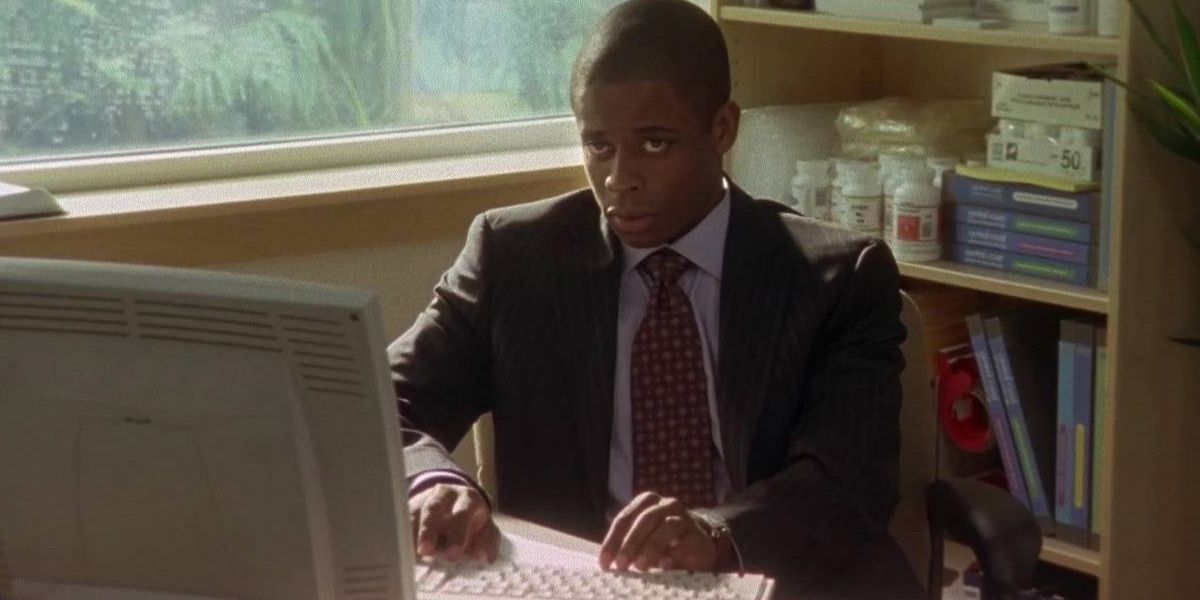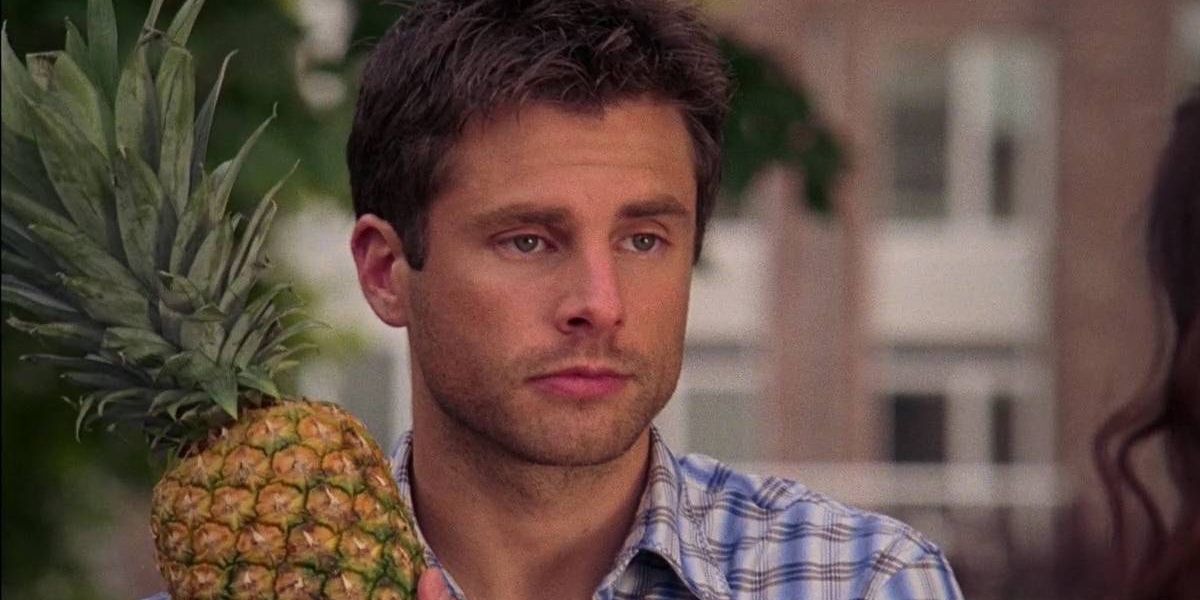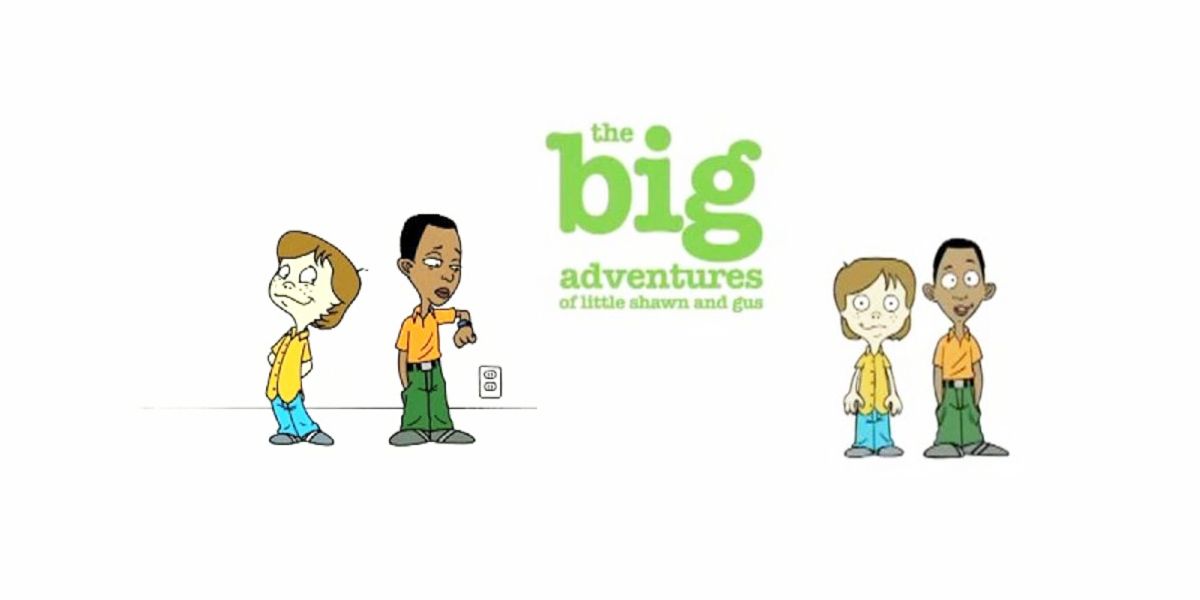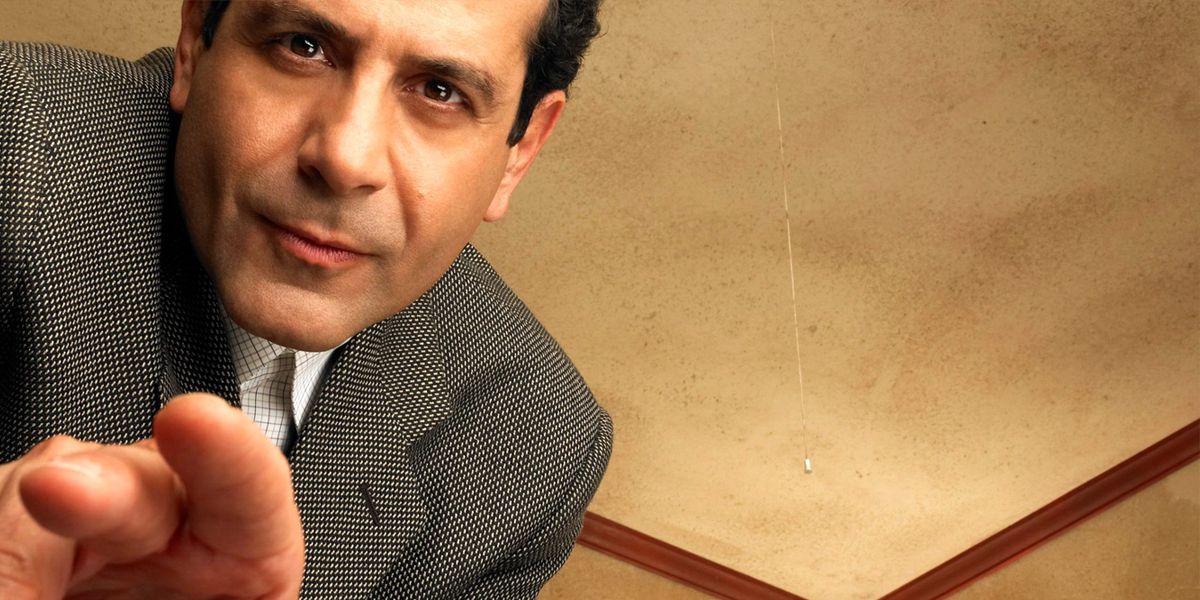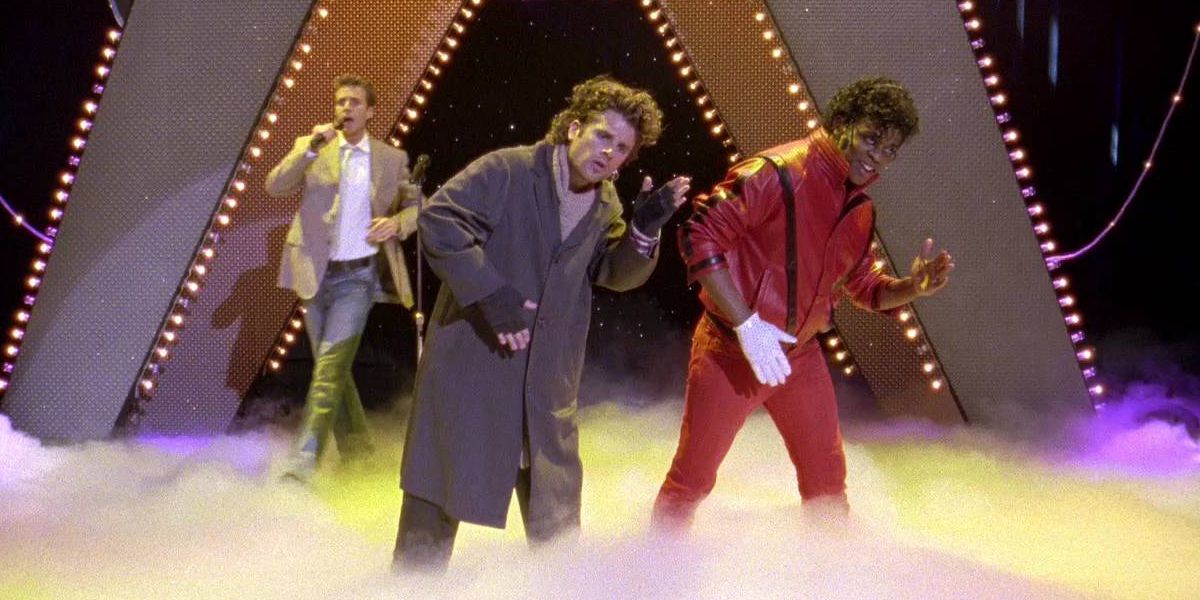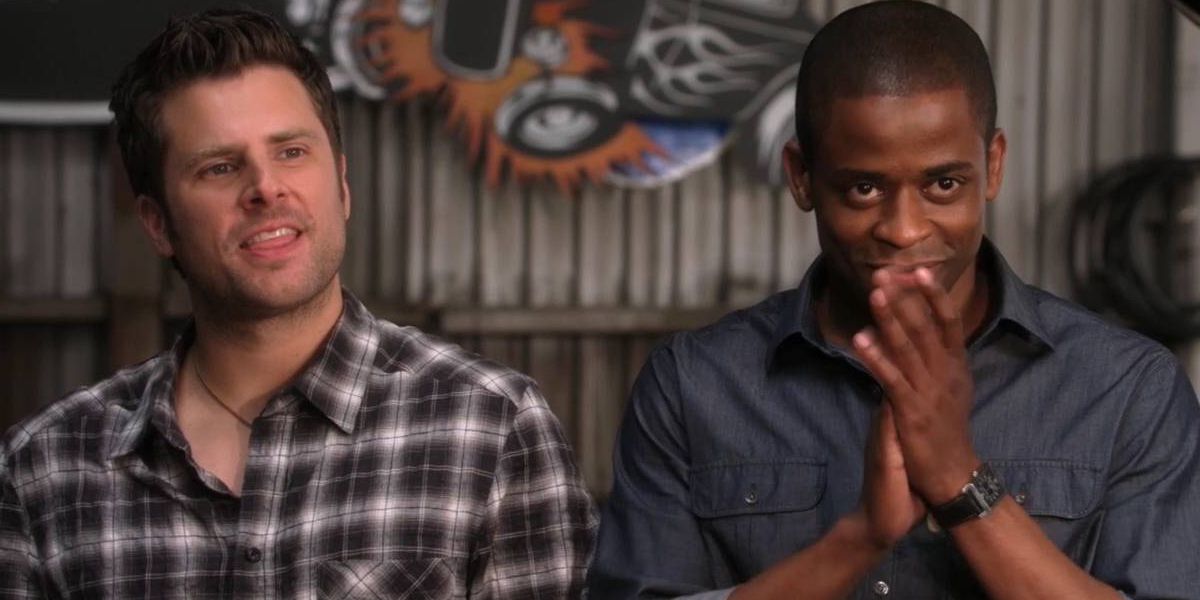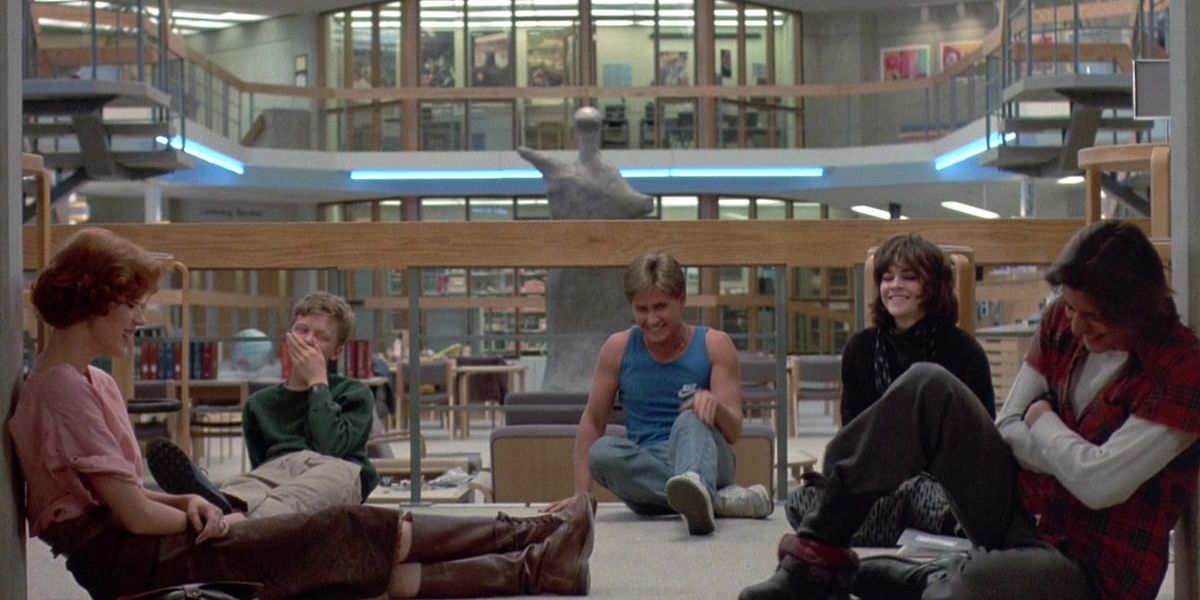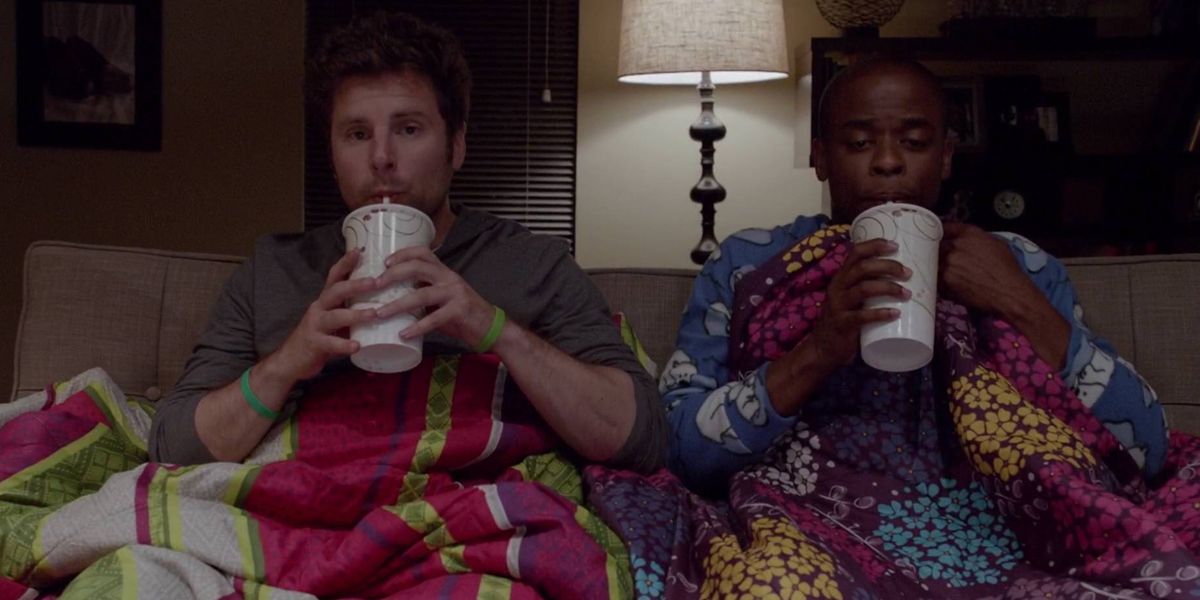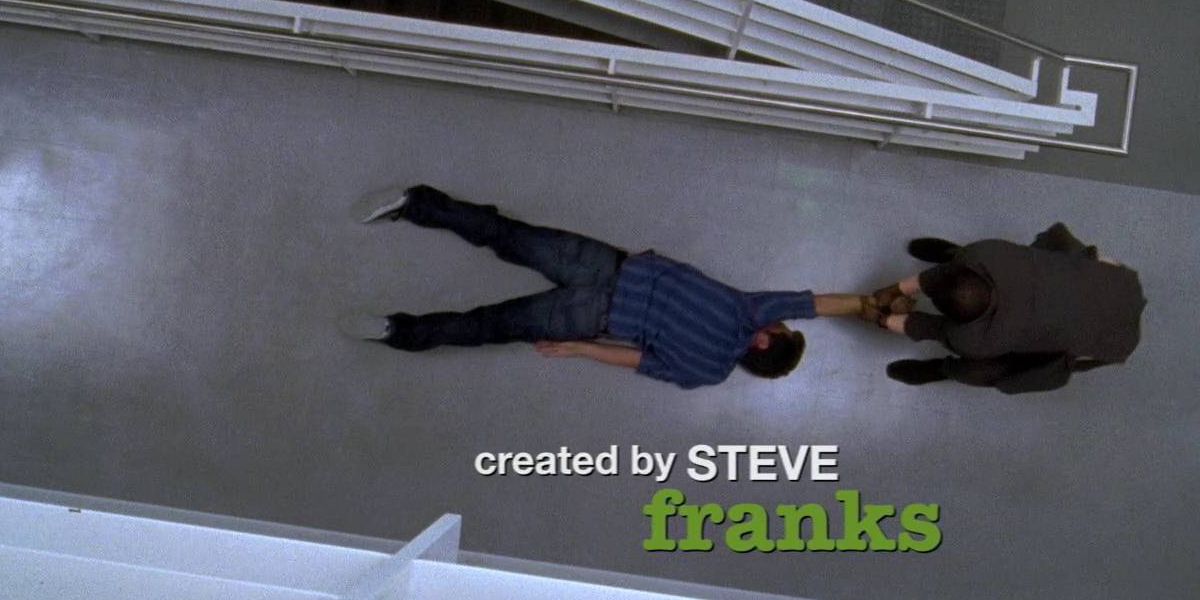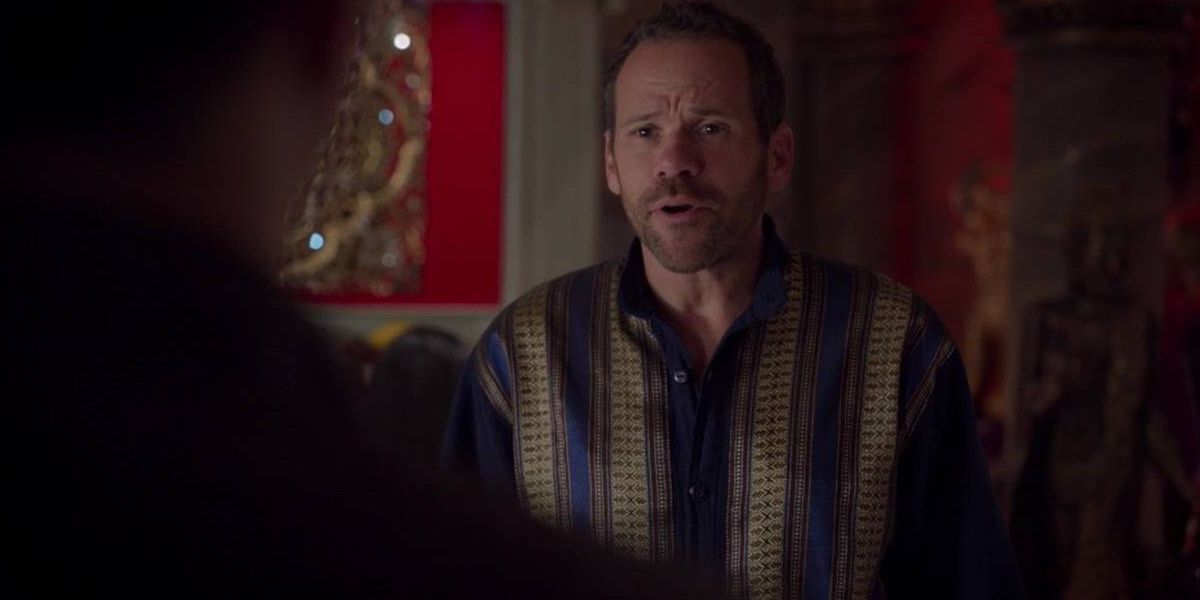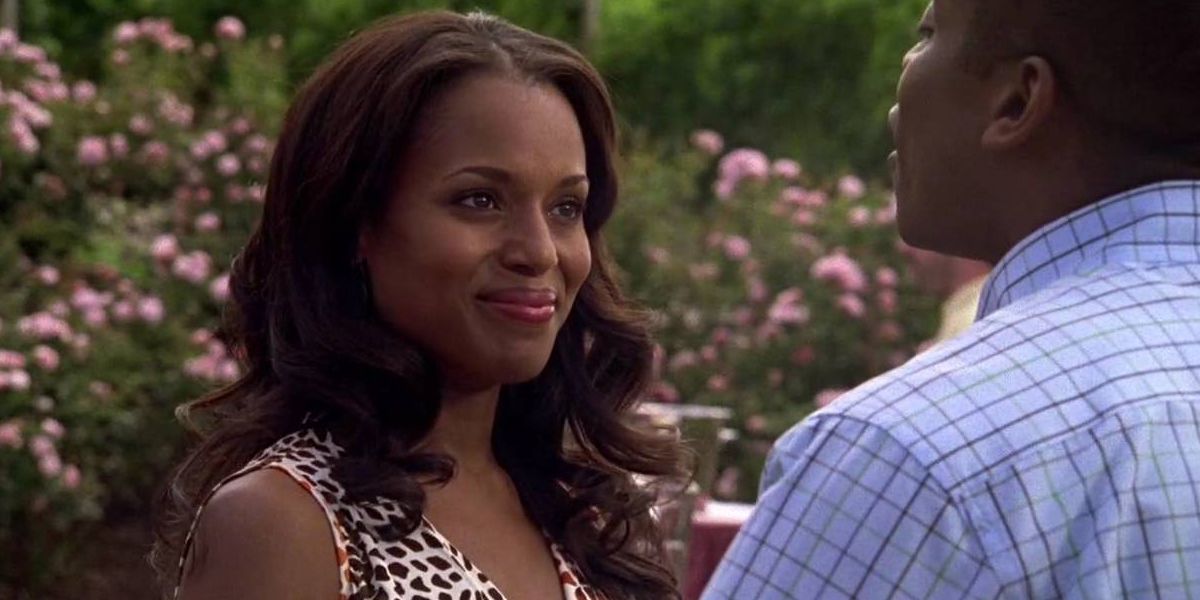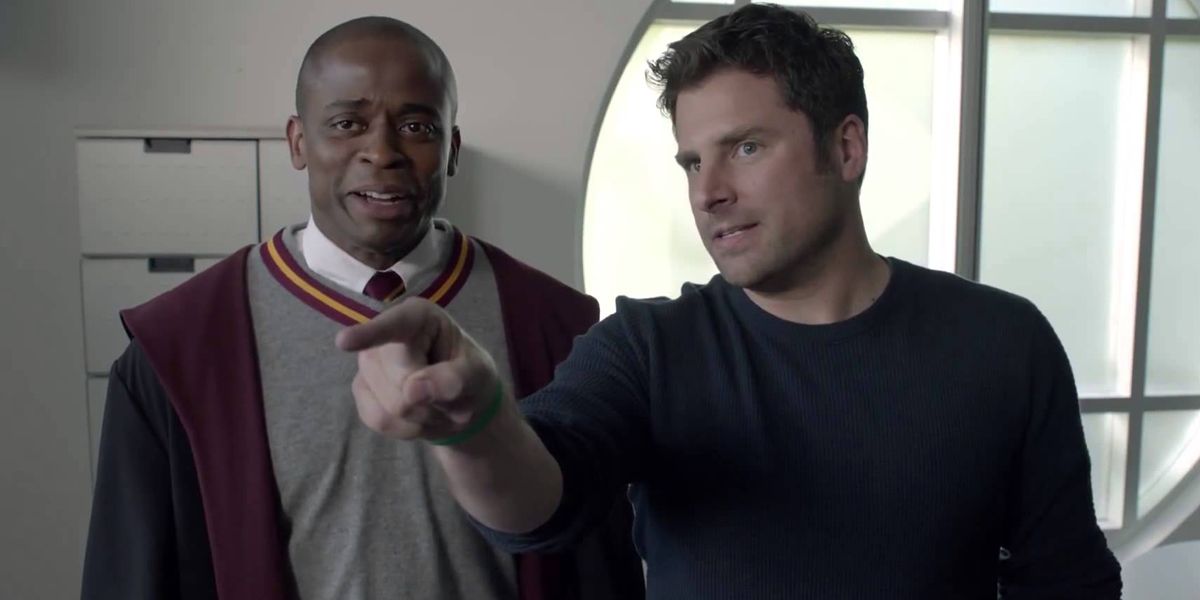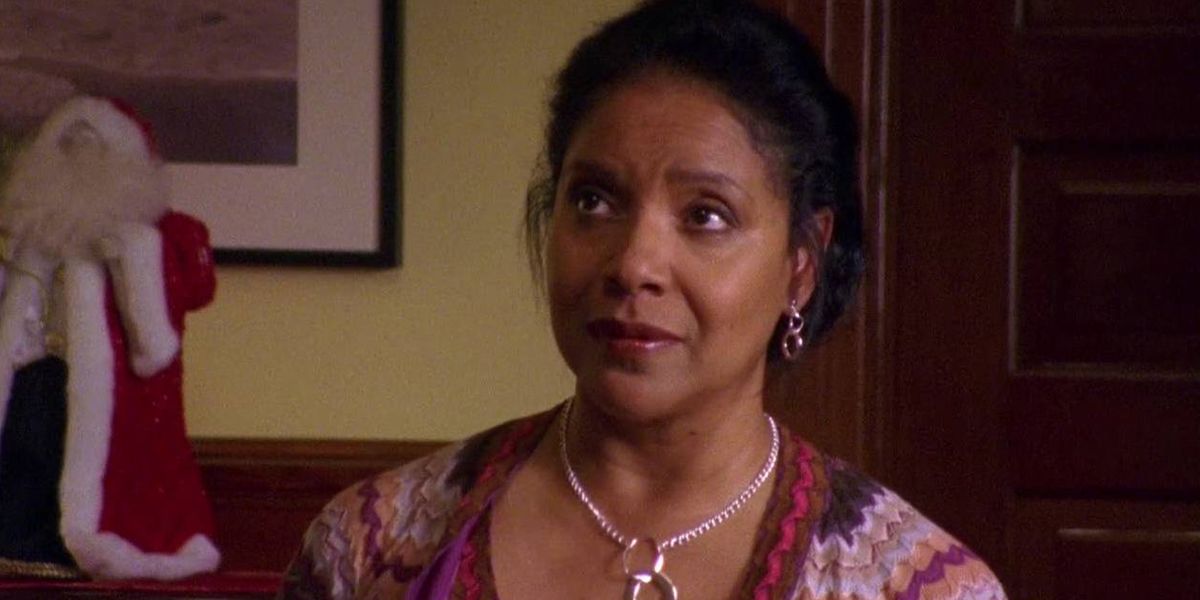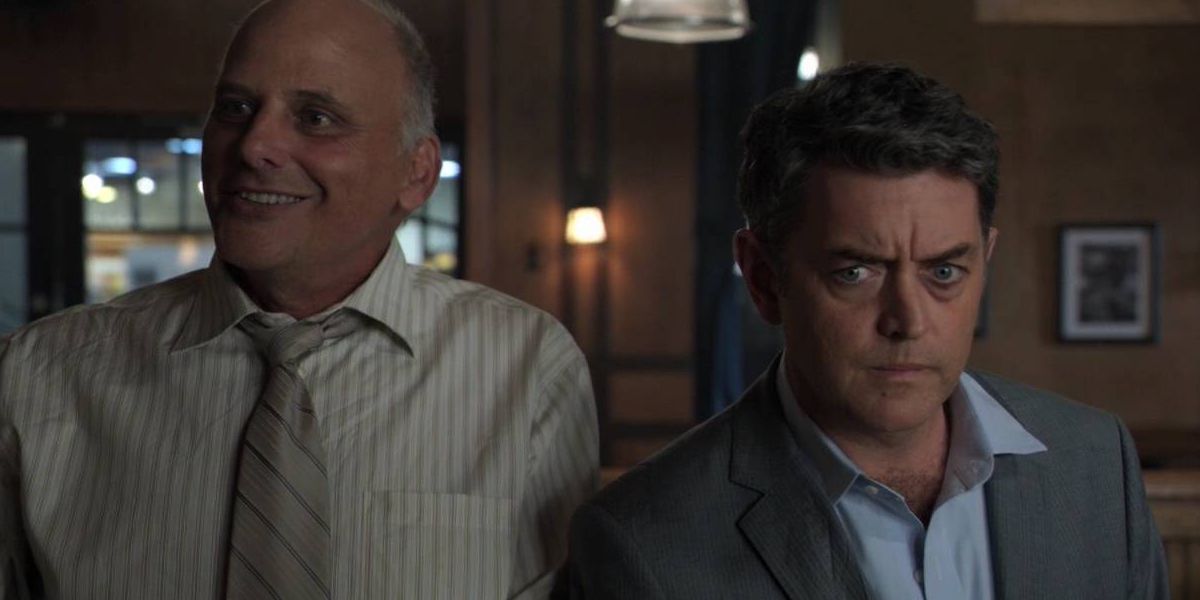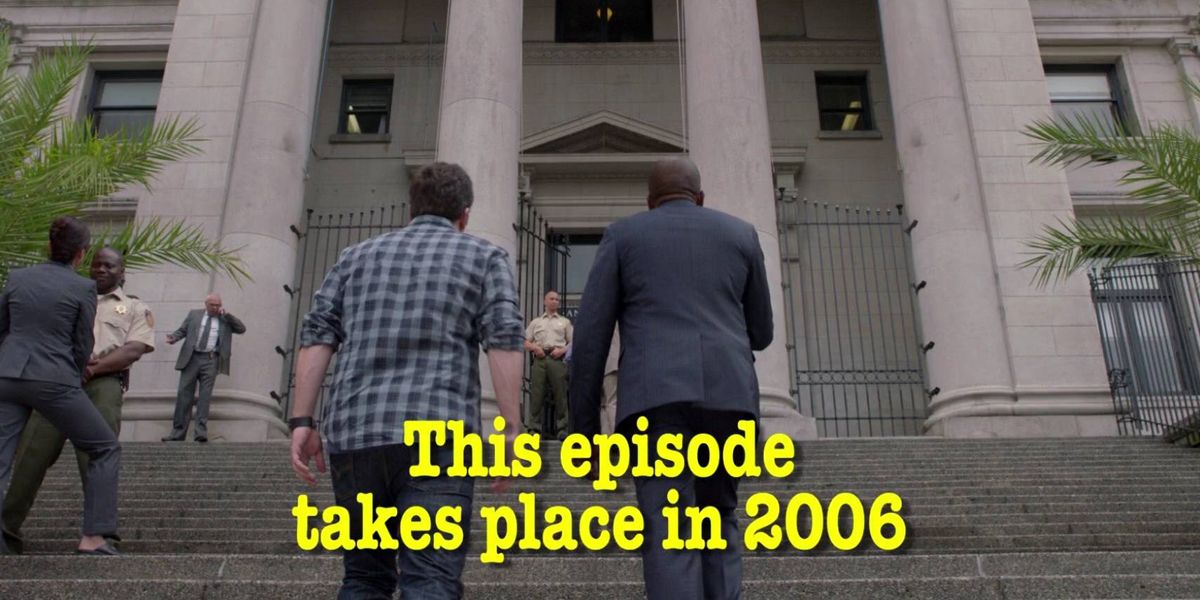Ever since the USA Network series Psych went off the air in March 2014, devoted fans of the show--cheekily known as Psych-os--have been calling for a revival. A Twitter account, @PsychTheMovie, was registered that same month in order to steer the campaign for more Psych. A month later in April 2014, the Twitter account @PsychRewatch was created in order to keep the fan community going strong with a weekly group viewing of an old episode. Various petitions and Facebook campaigns were also launched in order to bring the beloved series back.
Over the years, none of the cast members have shied away from wanting to return to Santa Barbara skies and revisit these zany characters. And in May 2017, USA Network finally gave the fans what they've been asking for all along with the announcement of a two hour Christmas movie set to air in December. In addition, there will be a Psych reunion panel at San Diego Comic Con this Friday, bringing together the majority of the series' cast for the first time in three years.
But before we look ahead to the Christmas movie and the teasers we're sure to get out of Comic Con, let's take a look back at some fun facts about the original series that might surprise even the most dedicated Psych-os around.
15. Dulé Hill left The West Wing to play Gus
Before Psych began airing in the summer of 2006, the series' co-lead Dulé Hill had previously spent six years starring as Charlie Young on the NBC political drama The West Wing. Over the course of the widely acclaimed series, Charlie's role developed from small supporting character to central member of the extended political family. He worked as an aide to both Martin Sheen's President Jed Bartlet and Allison Janney's Chief of Staff C. J. Cregg. In his personal life, he developed a romance with Elisabeth Moss' Zoey Bartlet, President Bartlet's youngest daughter. Through his romance with Zoey and his work as the president's aide, Jed and Charlie developed a quasi father/son relationship.
But as is the case with many family dynamics, by the beginning of season seven, Hill was ready to leave the nest. Although he returned for a few episodes of the final season of The West Wing, Hill opted not to return full time. Instead, he chose to film a new project for USA Network called Psych. The rest is pineapple-flavored history.
14. Pineapples are hidden in every episode, and it all started with an adlib
Speaking of pineapples, the spiny tropical fruit quickly became an easily recognized symbol of the series. This connection, however, wasn't one that the creator or writers planned themselves. In the filming of the pilot episode, James Roday noticed a prop pineapple sitting on set of the kitchen they were filming in. On a whim, he decided to adlib, grabbing the pineapple and asking Gus if he should "slice this up for the road" as they prepared to head off on their first investigation. The adlib worked so well in every take that they simply had to keep it in.
From there on, pineapples became an unexpected, yet integral part of the series. In almost every episode, there is at least one pineapple hidden for viewers to find. Sometimes, it's as simple as a pineapple in a bowl of fruit, but other times, things are a lot trickier. Pineapple upside down cakes, pineapple patterned shirts, and pineapples made out of LED lights have all been featured in the series. A fan moderated website was launched with the goal of providing a complete record of the location of every pineapple.
13. Animated shorts aired during early season episodes
While flashbacks to Shawn and Gus's younger years occurred throughout the majority of the series, Psych-os who watched the series as it aired were treated to extra glimpses of their childhood in an unlikely format. During the commercial breaks of season two episodes, USA Network aired animated shorts called The Big Adventures of Little Shawn and Gus. These shorts were designed by illustrator J. J. Sedelmaier, who worked on quirky animated hits including Beavis and Butt-head and The Ambiguously Gay Duo.
These Big Adventures followed the hi-jinks that Shawn and Gus got up to during their elementary school days. Selected episodes covered topics ranging from curiosity about the secrets of the girls' bathroom and the mysteries of the teachers' lounge. Certain episodes of season four were later accompanied by live action shorts showcasing the trouble teenage Shawn and Gus got up to in their high school days. However, the zany tone of the animated series could never be matched. In the end, fewer live action installments were produced, and only the animated shorts are available on the DVD sets.
12. The series had sneaky crossovers with Monk
Before USA Network had rebranded to become the home of darker dramas like Mr. Robot, it was known as a "blue skies" network where, according to their tagline, characters were welcome. As part of this lighter approach, the network made use of crossover commercials between its similar series in order to amuse and attract potential new viewers. Some of the best examples of these commercials included interactions between Psych's sloppy fake psychic Shawn Spencer and Monk's obsessive compulsive detective Adrian Monk.
As amusing as these advertisements were, none of these interactions were considered "canon." However, all of that changed with the series finale, "The Breakup." As the episode ends with Shawn and Gus relocating from Santa Barbara to San Francisco, Shawn offers his services to likewise relocated Chief Vick. However, she deflected his offer, assuring him that she already had someone who was now "in the kitchen, alphabetizing the pantry." Given Monk's San Francisco setting, and the detective's OCD tendencies, it's safe to assume that the series has established that Psych and Monk exist in the same universe. If only we got to see more of it.
11. The iconic episode "American Duos" was inspired by Roday and Hill goofing off
The first episode of Psych's second season, "American Duos," represents a big shift for the show. It is the first of many parodies in a series that offers tributes to The Hangover, Twin Peaks, and Clue among many others. Its parody of American Idol is pitch perfect (although the contestants are far from it), including an incredible performance from Tim Curry as the droll Nigel St. Nigel. This episode has further been credited as the episode that, according to The A.V. Club, "ended up defining Psych."
It comes as a huge surprise, therefore, that this episode was nowhere in the original plans for the series. According to Dulé Hill at a panel at Salt Lake Comic Con in March 2017, the concept of the episode came from Hill and Roday goofing off on set. While working late, they wondered what a version of Tears for Fears' "Shout" would sound like if Roland Orzabl had been joined by Michael Jackson instead of Curt Smith. As soon as creator Steve Franks witnessed their onset impressions, he knew he had to use it in a future episode. It suffices to say that "American Duos" more than delivered on the original idea.
10. Psych's longest running jokes also began as improvisations
The sheer length of montages of jokes that recur over the course of the series summarizes Psych's commitment to continuity. A nearly four and a half minute compilation details every time Shawn says "Gus, don't be...," including greatest hits such as "...a gooey chocolate chip cookie," "...this crevice in my arm," and "...the only black lead on a major cable network." Even more impressive, a nearly ten minute video contains every bizarre alias Shawn uses to introduce Gus over the years, including MC Clap Yo Handz, Gus T. T. Showbiz (where the extra T is for talent), and Hummingbird Saltalamacchia. Other recurring bits include the use of Ed Lover's catchphrase "c'mon, son!" and Gus's terrible pickup line "You heard about Pluto? That's messed up, right?"
While many of these bizarre lines of genius come from the series' writing staff, according to Roday and Hill, many of these jokes began as improvisation between them. For instance, Roday first called Hill's character Gus "Silly Pants" Jackson at random in a scene, throwing Hill off entirely and greatly amusing the crew. Additionally, Hill was once watching videos of Ed Lover on set and laughing hysterically at the "cmon, son!" segments, which inspired him and Roday to incorporate the line into their characters' banter.
9. Four members of The Breakfast Club appeared on the show...and the fifth might be in the Christmas movie
Psych never tried to hide its love of all things '80s. However, the most obvious object of affection within the series is the 1985 John Hughes film The Breakfast Club. The second episode of season three is a love letter to '80s movies in general, with a particular tribute to The Breakfast Club's iconic ending scene. Beyond this specific scene parallel, Psych boasts a particularly impressive fact: four of the five core members of the 1985 film appeared in the series.
Judd Nelson appeared in the season four episode "Death Is in the Air" as Dr. Steven Reidman. In season six, Molly Ringwald guest starred in the episode "Shawn Interrupted" as Nurse McElroy. Anthony Michael Hall had a brief arc across seasons seven and eight as Harris Trout, the antagonistic interim chief of police. Yet the most important guest star of all was Ally Sheedy, who recurred across the majority of the series as the obsessive serial killer Mr. Yang. While Emilio Estevez is the only cast member to not appear in Psych at some point, James Roday has previously hinted that things could change in the upcoming Christmas movie, so keep your fingers crossed, Psych-os.
8. None of the major networks thought the show could work
The idea for the series originally came to creator Steve Franks after the success of his 1999 film Big Daddy. Although his initial pitch of the idea was quickly rejected, he held onto it for future reference, and then pursued it again years later with the help of Kelly Kulchak, who would become executive producer of Psych when it made it on air in 2006.
In this second round of pitching, Franks and Kulchak shopped the pitch as a one hour blend of drama and comedy in the vein of Moonlighting and Remington Steele. During this round, they pitched the project in meetings with the major networks. However, even though Kulchak notes that "it was a great pitch and everybody laughed," ultimately, no network was willing to agree to buy the project due to the lack of dramedies on television at the time. When they met with USA Network as a last attempt at pitching, it was quickly apparent that the "blue skies" network was the perfect home for this quirky project, and the deal was made.
7. Psych's theme song is performed by the show's creator
Theme songs frequently have the difficult task of summarizing the premise of a show in a short and catchy format. This is typically true of '80s sitcoms, and as a comedy-drama obsessed with the '80s, it's only natural that Psych has a theme song that follows this formula. Psych's theme song, "I Know You Know," offers a cheeky commentary on people not being who they say they are, and people who don't want to grow up. The refrain even ends with the observation that "your worst inhibitions tend to psych you out in the end." This theme song is clearly meant to be entirely tongue in cheek and aligned with Shawn Spencer's viewpoint.
What makes this theme song even better is that the band who performs it, The Friendly Indians, is the band of series creator Steve Franks and writer Tim Meltreger. So when the theme song notes that "I know, you know that I'm not telling the truth," it's ironically clear that viewers are really able to take those words at their face value. After all, no one would know this character's mind better than the men who are responsible for bringing it to life.
6. Members of the crew have had cameos throughout the series
Crew members appearing in the works they produce is hardly a new phenomenon. Alfred Hitchcock having cameos in his movies is perhaps the most noteworthy example of this pattern. Psych continues this tradition, with many of its writers and even its creator having credited and uncredited speaking and nonspeaking roles throughout the series. Andy Berman, co-executive producer and writer for the show, appeared as two different characters, the creatively named Guy in a season one episode and Singh in the season six episode "Autopsy Turvy." Steve Franks has an uncredited cameo as a wandering zombie in the series' second to last episode, "A Nightmare on State Street."
Carlos Jacott, a writer for the series, appeared in four different episodes, across three different seasons, as four completely unrelated characters, ranging from men named Terrance and Geoff to the disconcerting Hell Hag in the previously noted "A Nightmare on State Street." Jay Chandrasekhar, who directed four episodes of the series, appeared in the season four episode "Bollywood Homicide" as Jawaharlal 'Jay' Singh. Similarly, just as crew members crossed over to act, certain members of the cast stepped behind the camera, with leading man James Roday directing eight episodes and writing sixteen.
5. Household names appeared on Psych before landing lead roles in their own shows
Longtime household names have guest starred on Psych, including William Shatner and George Takei of Star Trek fame, Cary Elwes of The Princess Bride, Cybill Shepherd of Moonlighting and Cybill, and the previously noted alumni of The Breakfast Club. However, certain guest stars, while now huge stars in their own right, weren't industry-wide recognized names when they first appeared on Psych.
In the season three episode "There Might Be Blood," Glee's very own Sue Sylvester, Jane Lynch, appeared as Chief Vick's sister, Coast Guard Commander Barbara Dunlap. Anthony Anderson, now the head of the Johnson family on the ABC sitcom Black-ish, appeared in the season six episode "True Grits" as Thane, a wrongly convicted man who tries to clear his name. And none other than Scandal's Olivia Pope, the lovely Kerry Washington, appears in the bizarre season two episode "There's Something about Mira" as the more than slightly crazy Mira Gaffney, who Gus married while drunk when he was in college.
4. The show produced over two and a half hours of "Psych-Outs"
While it's pretty standard for shows to include deleted scenes and blooper reels on their DVD sets, it's considerably less common for shows to air bloopers at the end of the episode. However, this is exactly what Psych did for much of its duration. Over the course of eight seasons, Psych put together over two and a half hours of "Psych-Outs," bloopers and deleted jokes that either aired at the end of the episode or were released on the official USA Network website.
These Psych-Outs frequently consist of the cast members breaking into song and dance, tripping over lines that are either too hard to say or too funny to get out without laughing, and doing impressions of people entirely unrelated to the scene at hand. What's even better is the fact that these Psych-Outs are all available in addition to the lengthy outtakes and deleted scenes on each season's DVD set. Based on all of this endlessly amusing material, Psych's cast might just take the championship title when it comes to having fun on the job.
3. Gus is not Bud from The Cosby Show, but Clair Huxtable is his mom
In the season one finale "Scary Sherry: Bianca's Toast," multiple guest characters ask Gus if he played Bud, Rudy Huxtable's best friend on The Cosby Show. This joke recurs a few more times over the series, mostly with Shawn purposefully mislabeling Gus as Bud even though it infuriates him. Yet even though Gus may not be Bud, the real Bud, Deon Richmond, guest starred in the series finale as Gus' new boss. Richmond's character even refers to Gus as Bud at one point, completing the confusing identity crisis in the most meta way possible.
Two other Cosby-related casting choices make this recurring joke even funnier. In an alternate universe episode in season five, "The Polarizing Express," Keshia Knight Pulliam, who played Rudy on The Cosby Show, appears as Gus' wife, Stranjay. Making matters even more confusing/amazing, Phylicia Rashad, who played the majestic Huxtable matriarch Clair, recurs as Gus' mother, Winnifred Guster. Gus may not have played Bud on The Cosby Show, but sometimes, it looks like he's come pretty close to living Bud's alternate reality life.
2. Psych gave two working actors their longest tenured jobs to date
If you've watched any genre series or sitcom since the 1980s, odds are that you've come across either Timothy Omundson or Kurt Fuller in your travels. Omundson, who had his first role in "The Cheever Letters" episode of Seinfeld, has been in series including Xena: Warrior Princess, Jericho, Judging Amy, and Galavant. Fuller, who boasts an impressive 190 credits on his IMDb page, has been in movies as diverse as Ghostbusters II, Midnight in Paris, The Pursuit of Happiness, and Wayne's World. Both men have also had memorable turns in the cult series Supernatural.
Omundson's and Fuller's careers have epitomized the path of a working actor; Omundson was even featured in the 2012 documentary That Guy...Who Was in That Thing about actors whose faces you recognize, but whose names you probably don't know. However, with their series regular roles in Psych, both men have officially secured their longest tenured jobs to date. The duration of the series, as well as their distinctive roles within it, will surely allow audiences to remember their characters Carlton Lassiter and Woody Strode for many years to come.
1. Psych is the first show to remake one of its own episodes
Nowadays, it's getting harder to think of older series and movies that aren't being subjected to the remake treatment. It's not a surprise anymore to see a headline about an animated movie being adapted into live action, or a superhero franchise being restarted with a new lead. What is a surprise, however, is a series deciding to remake one of its own episodes, and it just so happens that Psych was the first show to ever do this.
In season eight, Psych remade the season one episode "Cloudy...with a Chance of Murder" as "Remake AKA Cloudy...with a Chance of Improvement." While the episode didn't really improve on the original in any way, and actually got rid of some of the original episode's funniest lines, it nevertheless worked on a totally different level. "Remake" allowed Psych to bring back guest stars from earlier seasons and cast them in entirely different roles. It also allowed the characters to poke fun at the concept of unnecessary remakes in a very tongue in cheek way. Even if "Remake" didn't succeed in its objective, it still stands as a prime example of what Psych does best: having fun no matter what.
—
What are your favorite facts about Psych that weren't included here? Let us know in the comments!
Psych: The Movie will air on USA Network this December.

